2013 Gulf Guardian Winners
- On this page:
About the Gulf Guardian Awards
The Gulf of Mexico Program Partnership developed the Gulf Guardian awards as a way to recognize and honor the businesses, community groups, individuals, and agencies that are taking positive steps to keep the Gulf healthy, beautiful and productive. The Gulf Guardian Award exemplifies what the Gulf of Mexico Program is all about: innovative solutions that come about when we pool resources and look for creative ways to positively impact our quality of life and economic well being.
The first Gulf Guardian Award winners were recognized in 2000. Every year since, a first, second and third place award are given in seven categories:
- Business/Industry
- Civic/Non-Profit Organization
- Partnerships
- Youth Environmental Education
- Individual
- Environmental Justice/Cultural Diversity
- Bi-National
Since 2009, the Gulf Guardian awards are recognized on a biannual basis.
First Place Gulf Guardian Winners
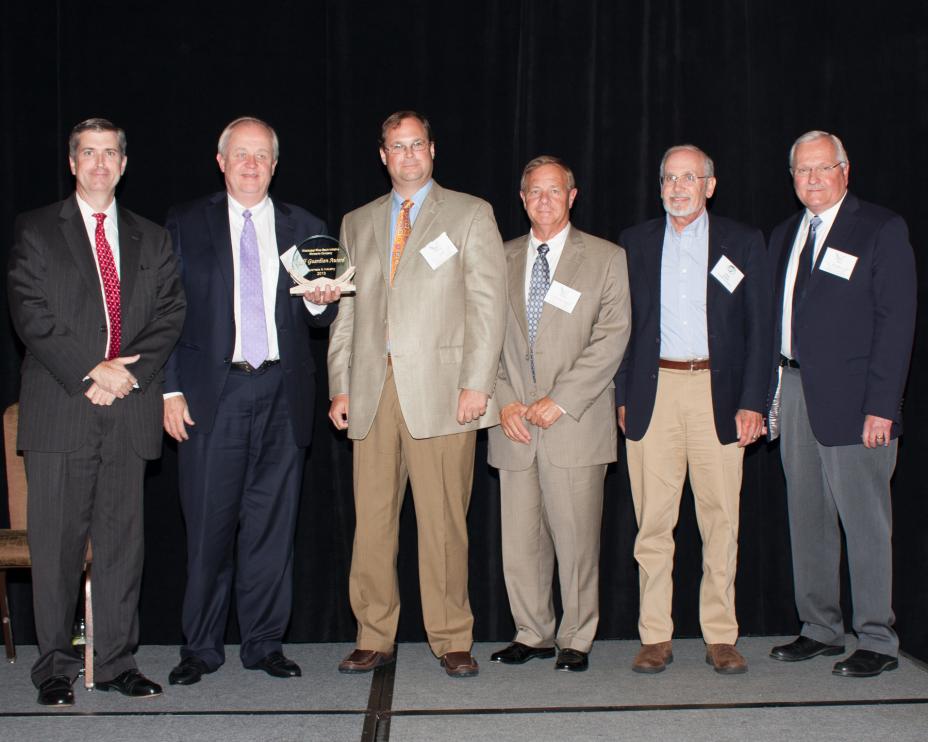 Pictured from left to right include Ben Scaggs, Michael Dykes, Trey Cook, Billy Kennedy, Bob Bendick & Bill Honker
Pictured from left to right include Ben Scaggs, Michael Dykes, Trey Cook, Billy Kennedy, Bob Bendick & Bill Honker
1st Place Business/Industry
The Monsanto Mississippi River Watershed Project
Monsanto Company
St. Louis, Missouri
The Monsanto Mississippi River Project engaged four NGOs (Audubon Society, Delta Wildlife, Iowa Soybean Association, and The Nature Conservancy) to advance conservation efforts that are reducing sediment and nutrients flowing to the Gulf of Mexico. The partnership effort was used to leverage conservation investments throughout the project area which are producing significant and quantifiable improvements in water quality, while creating and improving habitat for many species of fish and wildlife. With this project, Monsanto has set the bar for agribusiness conservation investments in the Mississippi River Basin.
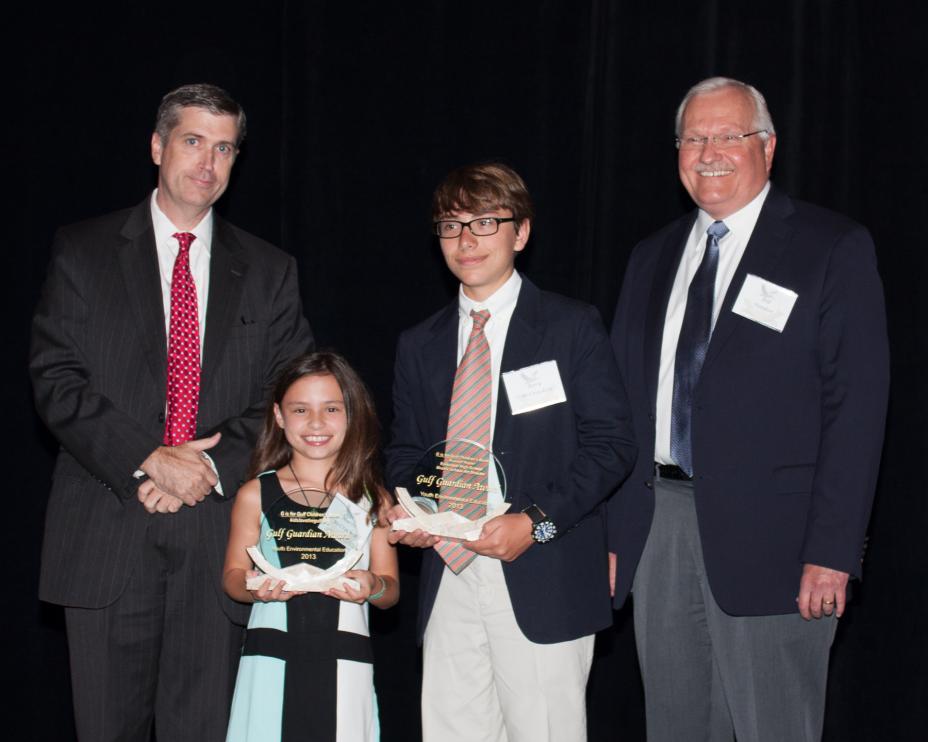 Pictured from left to right include Ben Scaggs, Maeve McCracken, Rory McCracken & Bill Honker
Pictured from left to right include Ben Scaggs, Maeve McCracken, Rory McCracken & Bill Honker
1st Place Youth Environmental Education
G is for Gulf Children’s Book
Kidslovethegulf.org and Episcopal High School
Baton Rouge, Louisiana
G is for Gulf is a children’s book dedicated to sharing facts and educating youth about the incredible ecosystem that is the Gulf of Mexico. Published in October of 2012, the book project was launched during the summer of 2011 by the non-profit organization kidslovethegulf.org. This group was founded by a brother and sister team in 2010 out of a heartfelt response to the BP oil spill.
 Pictured from left to right include Ben Scaggs, Ed Landgraf, Kent Satterlee, David Cresson & Bill Honker
Pictured from left to right include Ben Scaggs, Ed Landgraf, Kent Satterlee, David Cresson & Bill Honker
1st Place Environmental Justice/Cultural Diversity
Isle de Jean Charles - Saving a Vanishing Culture
Shell Exploration and Production Company
New Orleans, Louisiana
Isle de Jean Charles, “Saving a Vanishing Culture” has successfully created over 1,500 linear feet of protective “Recycled Shoreline” called Floating Islands. This protects the ONLY road linking two historic Louisiana Native American tribal communities to the main land. It also helps sustain and enhance coastal protection, fisheries and habitat in a region that is devastated by hurricanes, flooding and coastal erosion.
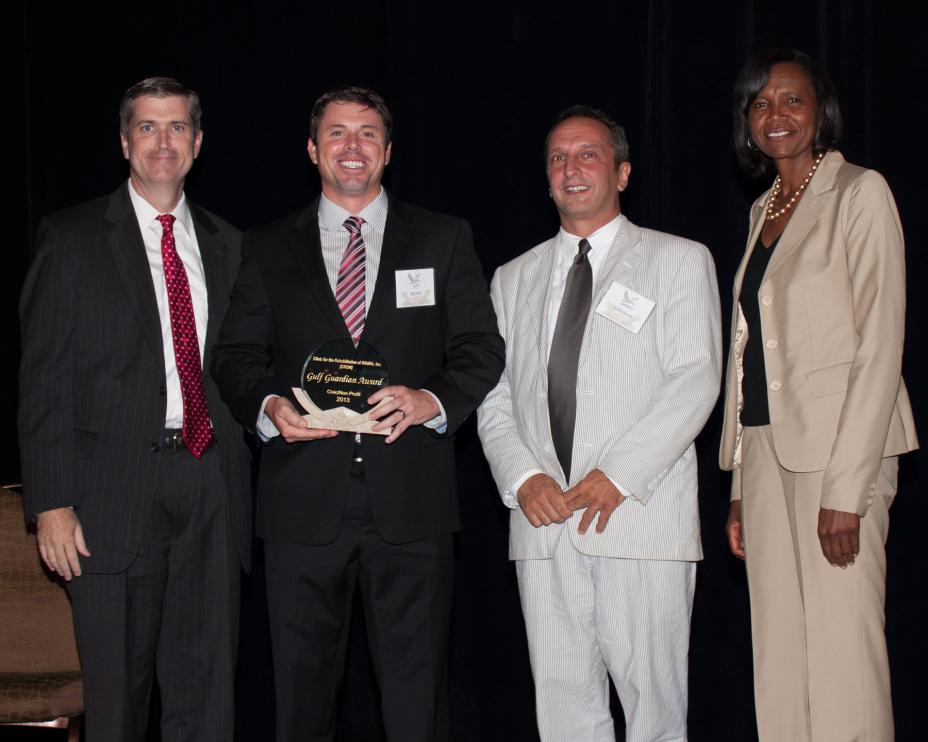 Pictured from left to right include Ben Scaggs, Jeff Burns, James Robinson & Beverly Banister
Pictured from left to right include Ben Scaggs, Jeff Burns, James Robinson & Beverly Banister
1st Place Civic/Non-Profit
Clinic for the Rehabilitation of Wildlife, Inc. (CROW)
Sanibel, Florida
For more than 40 years, CROW has been caring for and rehabilitating sick, injured or orphaned wildlife, including many threatened and endangered species, through a conservation medicine approach to care. In addition, CROW provides education to young people and adults that increases awareness of appropriate human/wildlife interaction and emphasizes the need for conservation of Southwest Florida's coastal wildlife habitats.
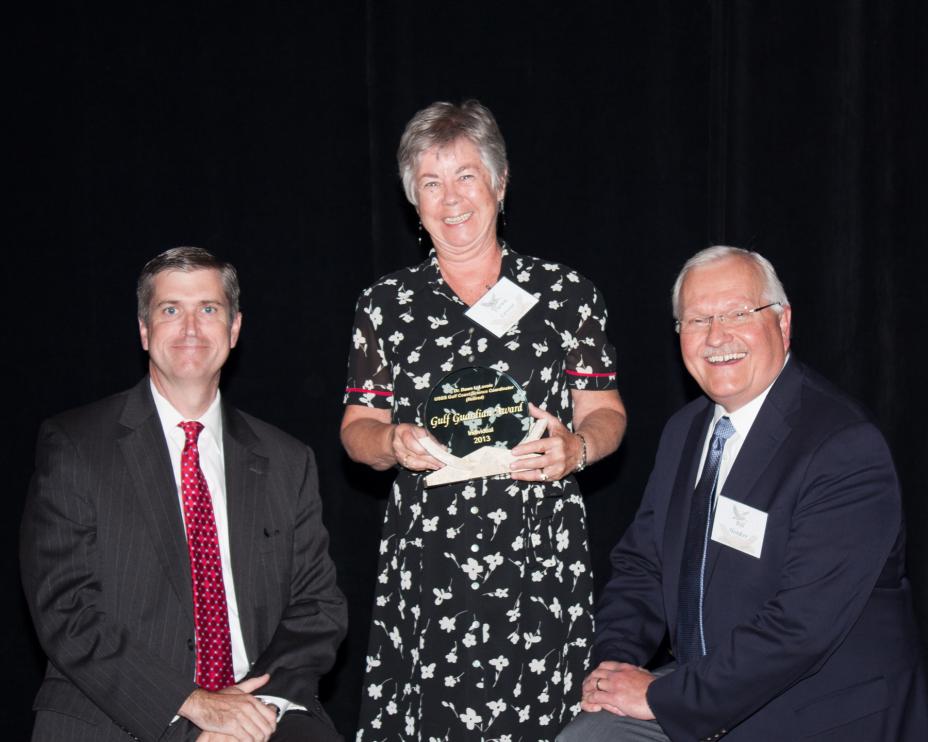 Pictured from left to right include Ben Scaggs, Dr. Dawn Lavoie & Bill Honker
Pictured from left to right include Ben Scaggs, Dr. Dawn Lavoie & Bill Honker
1st Place Individual
Dr. Dawn Lavoie
Retires, U.S. Geological Survey
Mandeville, Louisiana
Dr. Dawn Lavoie is especially deserving of this award because in her passion for loving the Gulf of Mexico, she always spoke out for what was “right!” This was evident when Dr. Lavoie spoke out to save the Chandeleur Islands (part of Breton National Wildlife Refuge) when the Deepwater Horizon Oil Spill Berm was being proposed. Her work and research assured that the berm would not ultimately damage the island and precious Refuge over the long term.
 Pictured from left to right include Ben Scaggs, Gerardo Gold, Porfirio Alvarez Torres & Bill Honker
Pictured from left to right include Ben Scaggs, Gerardo Gold, Porfirio Alvarez Torres & Bill Honker
1st Place Bi-National
Gulf of Mexico Large Marine Ecosystem
Mexico and the United States
The efforts of Mexico through SEAMARNAT (Secretariat of Environment and Natural Resources, Mexico) and the National Oceanic & Atmospheric Administration Southeast Fisheries Center to develop a UNIDO (United Nations Industrial Development Organization) Large Marine Ecosystem for the Gulf of Mexico came to fruition in 2009. Since then, concepts of the connectivity among all the ecosystems as part of the whole Gulf of Mexico ecosystem and the theory of a system with no physical or ecological boundaries, despite national ownership of shores and exclusive economic zones, have been the forefront in the development of strategies and implementation to the benefit of societies and resources of all nations.
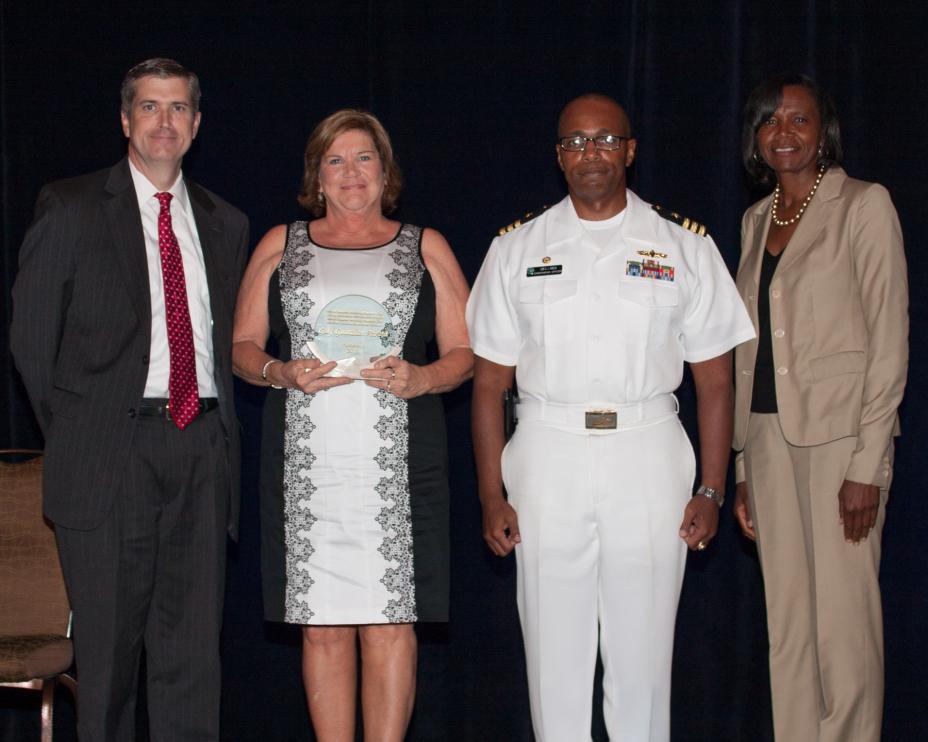 Pictured from left to right include Ben Scaggs, Jonnie Smallman, Anthony Anglin & Beverly Banister
Pictured from left to right include Ben Scaggs, Jonnie Smallman, Anthony Anglin & Beverly Banister
1st Place Partnerships
Naval Support Activity Panama City Living Shoreline Restoration Project
Naval Support Activity Panama City
Panama City Beach, Florida
Naval Support Activity Panama City (NSA PC) partnered with the local community hosting 28 events from October 2010 to July 2011 that involved two Earth Day shoreline cleanup events, oyster reef installation and grass plantings. Volunteers ranged from high school students in advanced science classes, volunteers from local environmental organizations, Navy and Air Force military and civilian personnel, plus 100 students from eight universities that volunteered as an alternative Spring Break. Over 600 volunteers donated an astounding total of 2840 hours in support of the project to install a living shoreline along 2,800 feet of NSA PC’s shoreline.
Second Place Gulf Guardian Winners
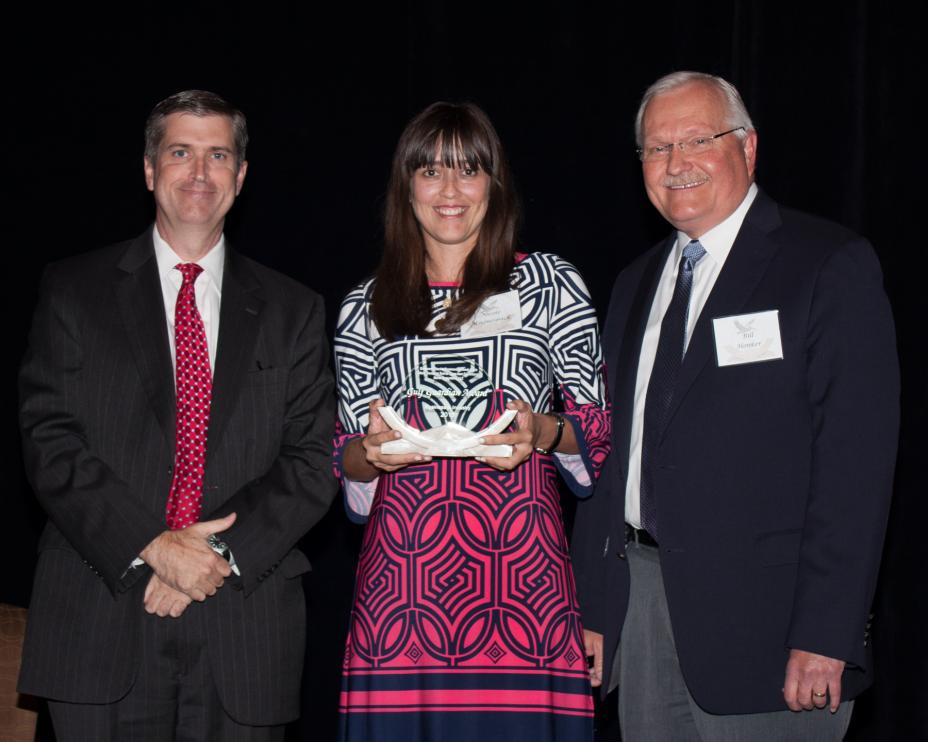 Pictured from left to right include Ben Scaggs, Nicole Waguespack & Bill Honker
Pictured from left to right include Ben Scaggs, Nicole Waguespack & Bill Honker
2nd Place Business/Industry
BioHaven® Floating Treatment Wetlands Waste Water Treatment Tool for Ealyn Hunt Correctional
Martin Ecosystems, LLC
Baton Rouge, Louisiana
The BioHaven® Floating Treatment Wetland (BFTW) project at Elayn Hunt Correctional was done to determine how this new innovative water treatment tool could remove unwanted nutrients from wastewater prior to discharge to the environment. In the five years prior to the implementation of this project and launching of the BFTWs into the wastewater system, the facility had an average of 10 noncompliance reports. Following the installation of BFTWs non-compliance events have been reduced to 1 or less per year.
2nd Place Youth Environmental Education
Oppe Elementary Campus of Coastal Studies
Galveston, Texas
Since 2010, Oppe Elementary School has implemented a Coastal Studies program which infuses coastal concepts with standard curriculum. Located on Galveston Island, this program utilizes a variety of resources that island living has to offer. Students are exposed to eco-field trips that promote restoration of habitats such as the sand dunes and wetlands and provide hands-on experiences.
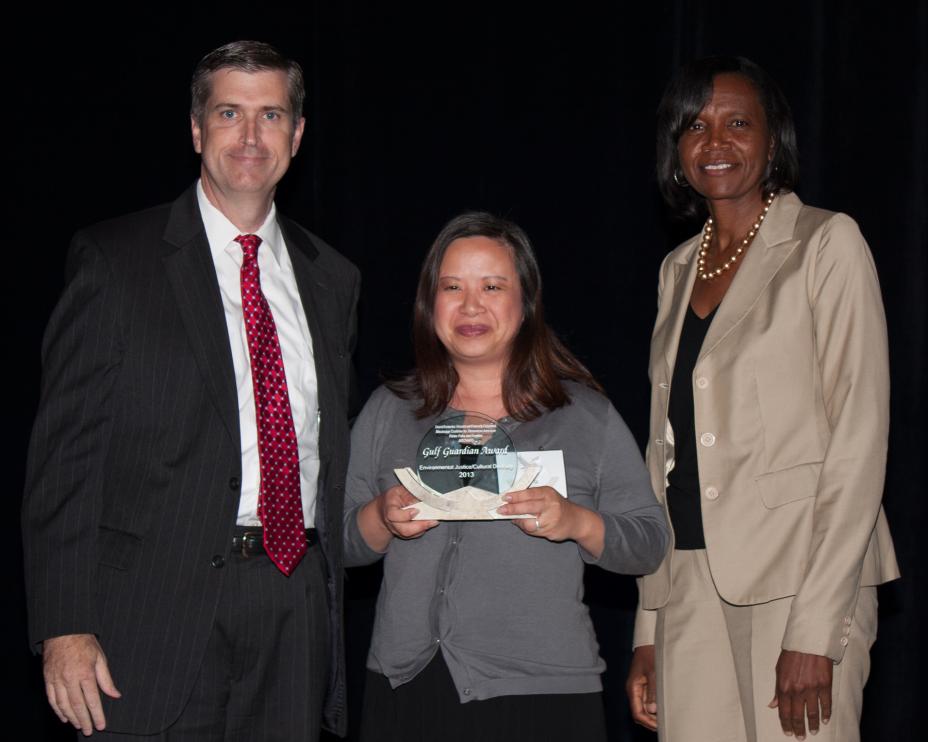 Pictured from left to right include Ben Scaggs, Thao Vu & Beverly Banister
Pictured from left to right include Ben Scaggs, Thao Vu & Beverly Banister
2nd Place Environmental Justice/Cultural Diversity
Coastal Restoration: Education and Community Engagement
Mississippi Coalition for Vietnamese-American Fisher Folks and Families
Biloxi, Mississippi
The MSCVAFF Coastal Restoration: Education and Community Engagement Project promotes community education and empowerment with a particular focus on engagement in the Natural Resource Damage Assessment (NRDA) and the Coastal Restoration process in Mississippi. As a result of the BP Oil Spill’s devastating impact to the ecosystem, fisheries and other natural resources in the Gulf of Mexico, Vietnamese-American fisher folks expressed their likelihood of being able to continue fishing as one of their primary concerns. MSCVAFF increased and strengthened efforts to conduct targeted outreach, addressed language access needs, and organized a series of focus groups/ community meetings for the purpose of helping fisher folks become more educated on the coastal restoration process and its critical link to their livelihoods.
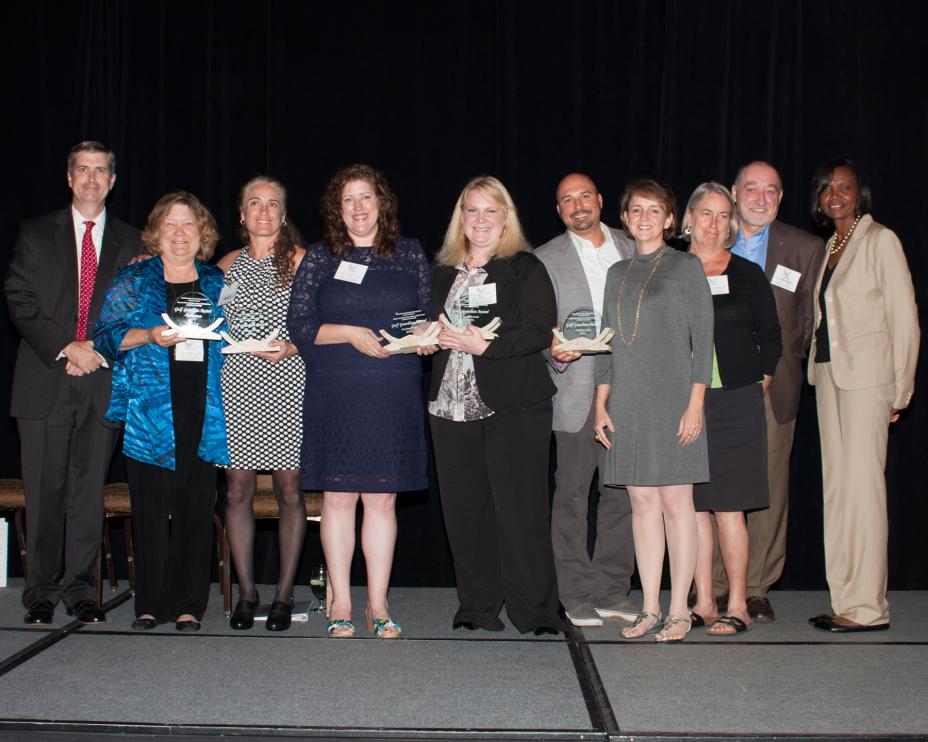 Pictured from left to right include Ben Scaggs, Sharon Walker, Christina Simoniello, Debbie Stone, Samantha Morris, Marc Battaglia, Lee Yokel, Diane Lindstedt, Mike Spranger & Beverly Banister
Pictured from left to right include Ben Scaggs, Sharon Walker, Christina Simoniello, Debbie Stone, Samantha Morris, Marc Battaglia, Lee Yokel, Diane Lindstedt, Mike Spranger & Beverly Banister
2nd Place Civic/Non-Profit
Are You an Eco-Hero?
Institute for Marine Mammal Studies
Gulfport, Mississippi
The Eco-Hero project is the first product to communicate the Gulf of Mexico Alliance Priority Issues to the public in a fun, interactive way. The Eco-Hero game benefits a broad community, including millions of residents and visitors to the Gulf of Mexico. The data integrated into the game (e.g., oceanographic and meteorological conditions, water quality, ecosystem services, natural and anthropogenic stressors to the GOM, community resilience), incorporates the value and need for research, monitoring, and careful management of the Gulf’s living and non-living natural resources.
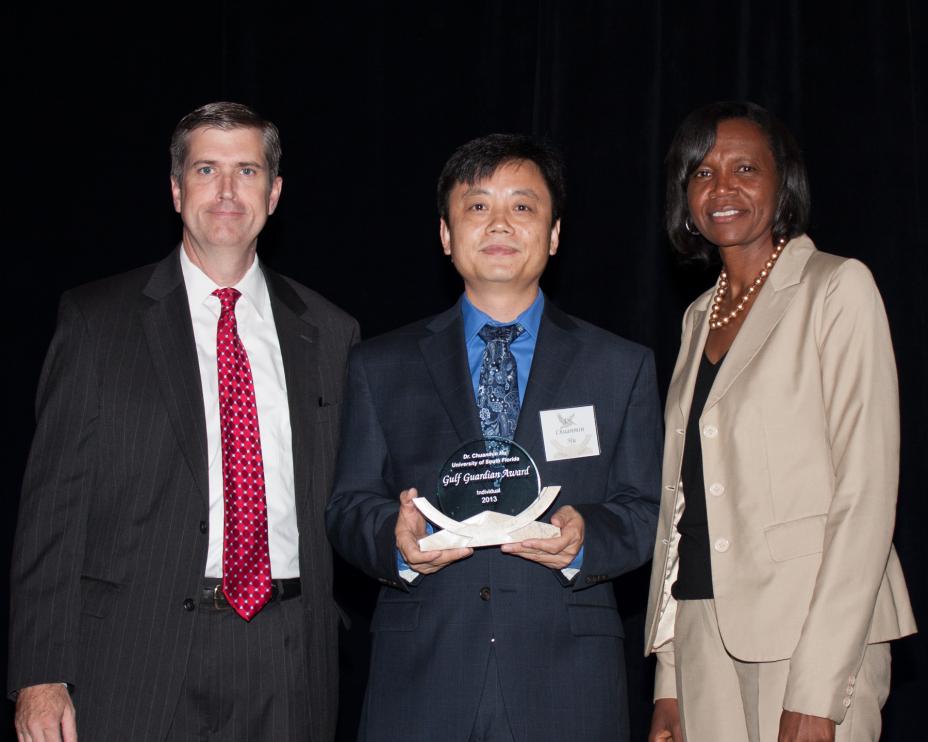 Pictured from left to right include Ben Scaggs, Dr. Chuanmin Hu & Beverly Banister
Pictured from left to right include Ben Scaggs, Dr. Chuanmin Hu & Beverly Banister
2nd Place Individual
Dr. Chuanmin Hu
University of South Florida
St. Petersburg, Florida
Professor Chuanmin Hu is truly motivated to help sustain a healthy Gulf. What is exceptional is that in addition to his normal duties at USF, he is dedicated to helping the community through education and outreach as well as through working with stakeholders and providing customized data products and timely information. Such information on red tides, Sargassum, and oil spills has helped various user groups to develop improved strategies to monitor or adapt to these events or mitigate their adverse impacts.
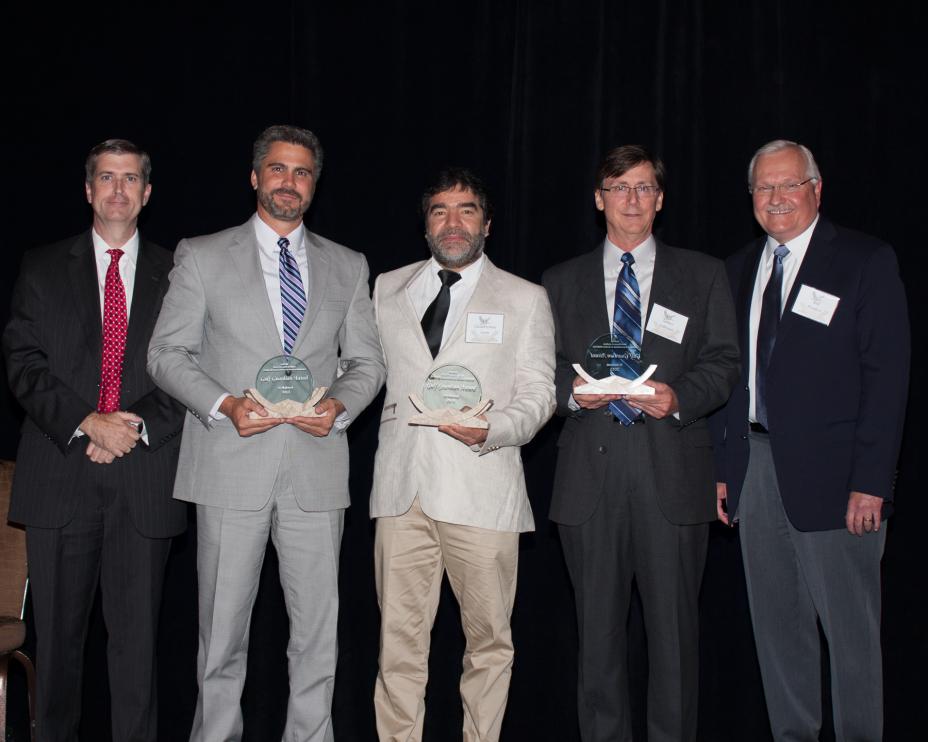 Pictured from left to right include Ben Scaggs, David Yoskowitz, Cuahtemoc Leon, James Gibeaut & Bill Honker
Pictured from left to right include Ben Scaggs, David Yoskowitz, Cuahtemoc Leon, James Gibeaut & Bill Honker
2nd Place Bi-National
Gulf 360
Harte Research Institute and Centro de Especialistas en Gestión Ambiental
Corpus Christi, Texas
Gulf 360 is a one-stop document and searchable geospatial database that focuses on the coastal socioeconomic characteristics of the Gulf of Mexico. Gulf 360 is the first effort that encompasses socioeconomic data from the three countries in the Gulf of Mexico (Cuba, Mexico, United States) and can act as a benchmark for future analysis. The output can be used by the private sector, non-governmental organizations, academics, and government entities in order to make more effective decisions by incorporating socioeconomic information.
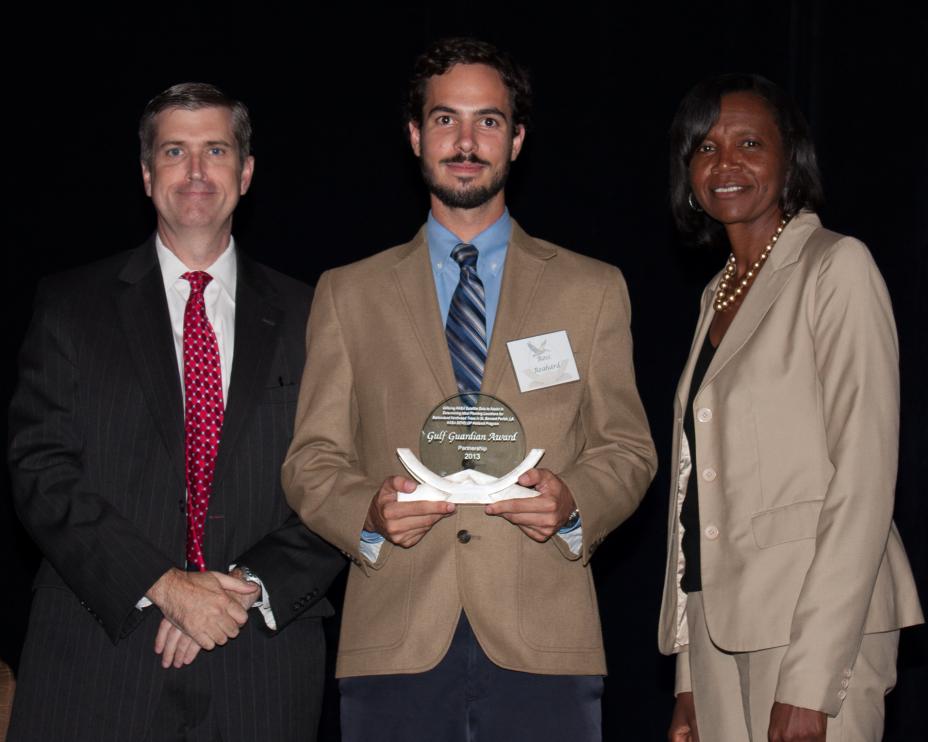 Pictured from left to right include Ben Scaggs, Ross Reahard & Beverly Banister
Pictured from left to right include Ben Scaggs, Ross Reahard & Beverly Banister
2nd Place Partnerships
Louisiana Ecological Forecasting: Utilizing NASA Satellite Data to Assist in Determining Ideal Planting Locations for Bottomland Hardwood Trees in St. Bernard Parish, Louisiana
NASA DEVELOP
Hampton, Virginia and Stennis Space Center, Mississippi
NASA DEVELOP is a capacity-building program engaging students to utilize NASA Earth observations to address community environmental concerns. DEVELOP interns at NASA’s Stennis Space Center established a partnership with local nonprofit organizations to provide analysis and recommendations for suitable planting sites for bald cypress trees in St. Bernard Parish, Louisiana. As a result, partners are currently using this analysis, instead of their previous subjective methods, to direct the spring 2013 planting of 6,000 saplings.
Third Place Gulf Guardian Winners
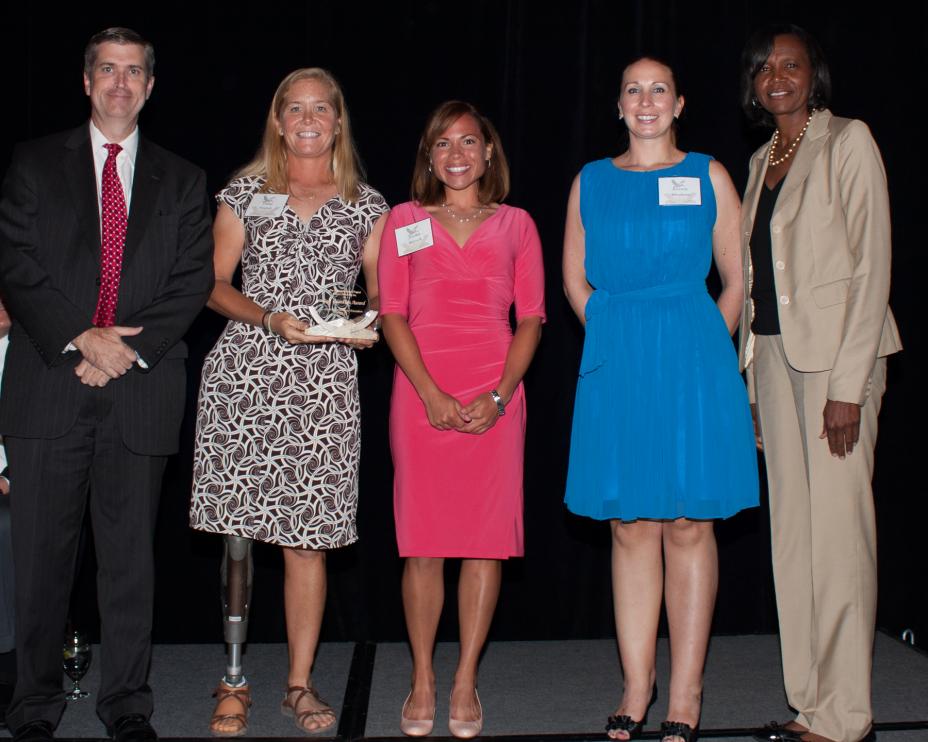 Pictured from left to right include Ben Scaggs, Dana Pounds, Jessika Blersch, Kristen Abraham & Beverly Banister
Pictured from left to right include Ben Scaggs, Dana Pounds, Jessika Blersch, Kristen Abraham & Beverly Banister
3rd Place Youth Environmental Education
The Island Adventures Project
Nature’s Academy, Inc.
Bradenton, Florida
Since 2009, the Island Adventures Project (IAP) has impacted over 4,500 Pinellas and Manatee County fifth grade students in Florida. At no cost to the schools, participants are given the opportunity to investigate the complex ecological connections comprising their local estuaries, watershed and barrier islands. The IAP aims to improve local science literacy by delivering an engaging educational experience that further connects coastal communities with their local environment and ultimately the Gulf of Mexico.
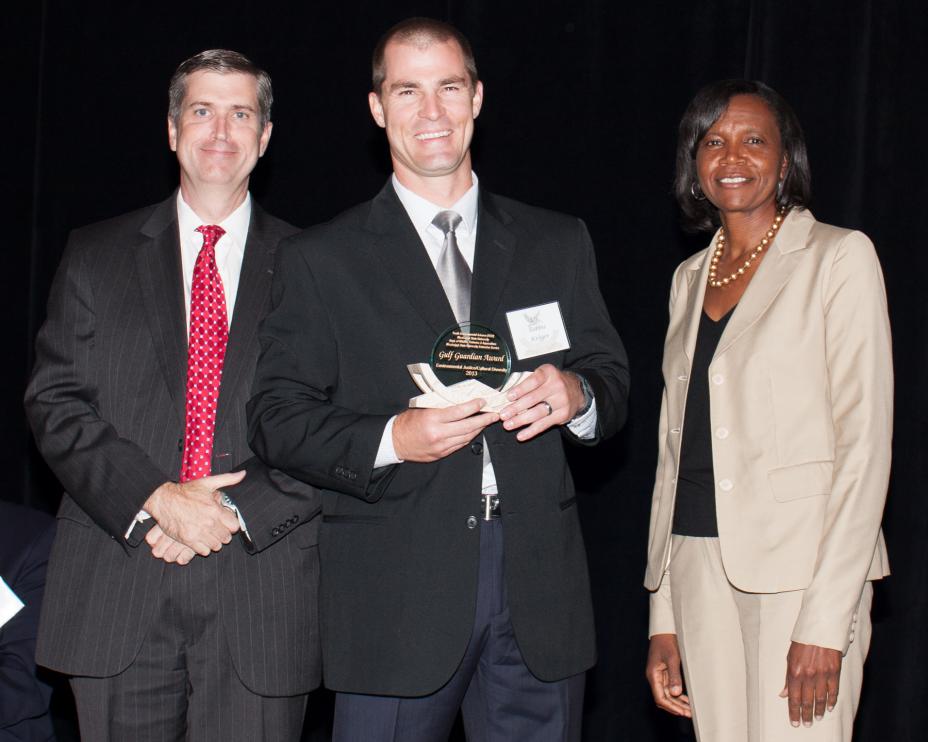 Pictured from left to right include Ben Scaggs, Robbie Kroger & Beverly Banister
Pictured from left to right include Ben Scaggs, Robbie Kroger & Beverly Banister
3rd Place Environmental Justice/Cultural Diversity
Youth Environmental Science (YES!)
Mississippi State University and Mississippi State University Extension Service
Mississippi State, Mississippi
Youth Environmental Science! (YES!) is an immersive, in-school, environmental science program that develops knowledge and stewardship while eliminating participation barriers. The goal of YES! is to provide relevant, experiential, science-based environmental knowledge and activities that will promote understanding of environmental issues and career options and encourage positive changes in environmental stewardship in diverse community groups in Mississippi. The program has been implemented for 2 years in a public school district in which 65% of the students are from underserved groups.
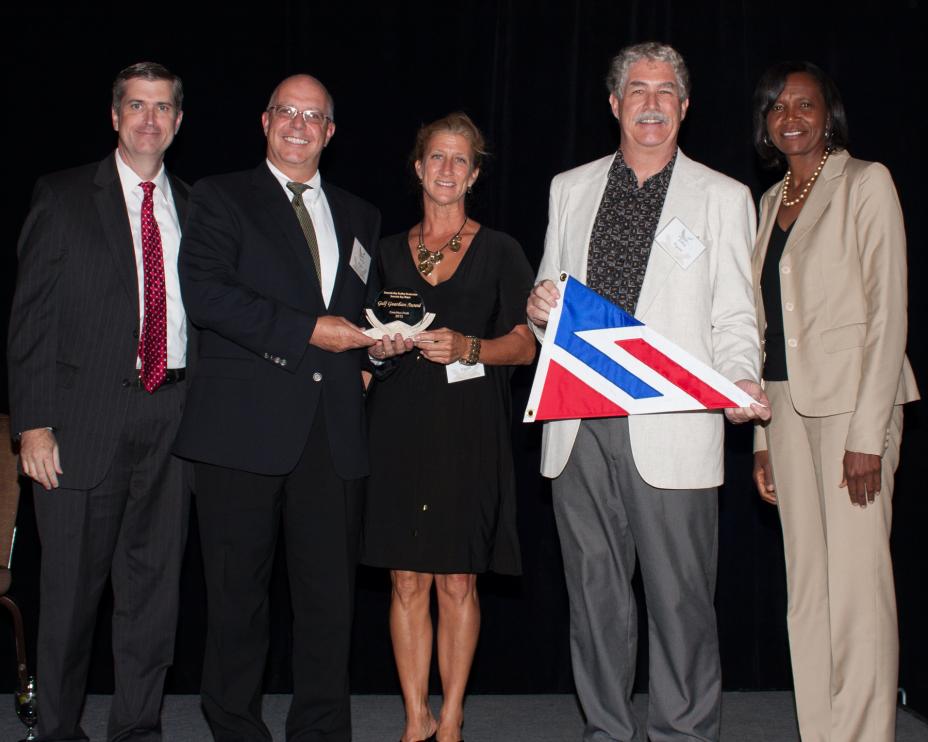 Pictured from left to right include Ben Scaggs, Larry Stults, Ronda Ryan, John Ryan & Beverly Banister
Pictured from left to right include Ben Scaggs, Larry Stults, Ronda Ryan, John Ryan & Beverly Banister
3rd Place Civic/Non-Profit
Sarasota Bay Scallop Restoration
Sarasota Bay Watch
Osprey, Florida
Sarasota Bay Watch’s created a community-based partnership of engaged citizens, organizations and local businesses, along with regional scientific and research groups, to undertake a long-term project to restore scallops to Sarasota Bay. SBW has raised $37,000 to date and, working together with Mote Marine Laboratory, Sarasota Bay Estuary Program and Florida Fish and Wildlife Research Institute, released over 24 million scallop larvae into the bay. The project is community-led, locally providing the majority of the funding and volunteers, while research partners study the science of the restoration process.
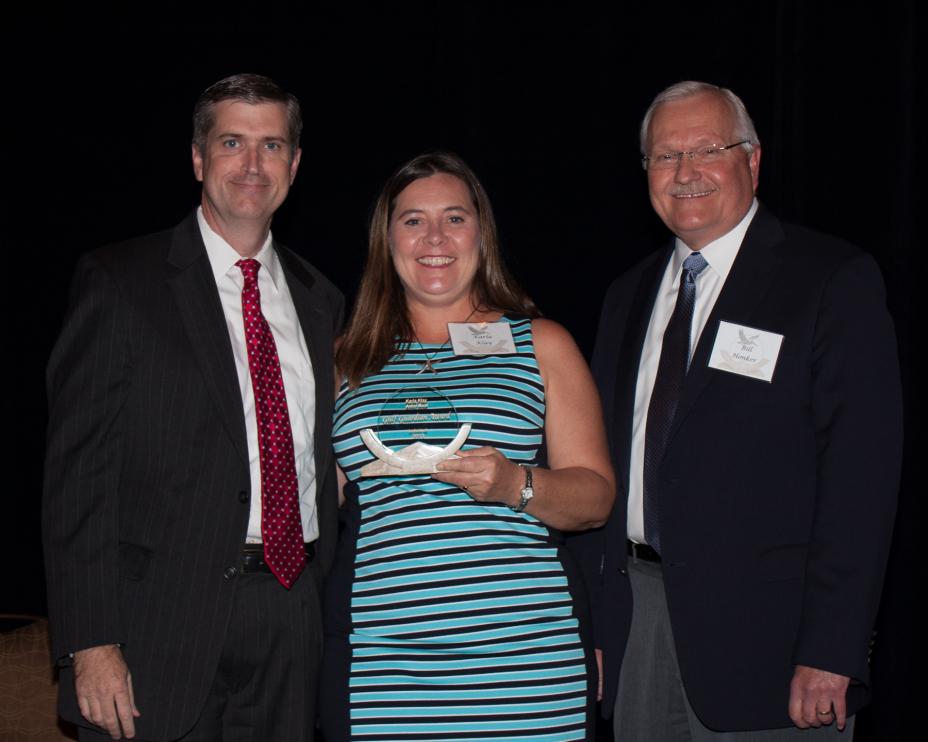 Pictured from left to right include Ben Scaggs, Karla Klay & Bill Honker
Pictured from left to right include Ben Scaggs, Karla Klay & Bill Honker
3rd Place Individual
Karla Klay
Artist Boat
Galveston, Texas
Karla has dedicated her life to connecting people to places in the Gulf region through meaningful experiences that integrate the arts and sciences to instill a stewardship ethic and ultimately improve environmental outcomes in communities throughout the region. Karla’s vision for an interdisciplinary approach to environmental education is realized in programs and projects she designs and implements through Artist Boat, a non-profit organization she founded and leads in Galveston, Texas, which has directly served over ~65,000 program participants and indirectly served many more through public art and habitat stewardship projects since it was established in 2003. Karla’s innovation in the environmental education field is evident in her development of Artist Boat as a vehicle to deliver effective environmental education programming integrating the arts and sciences.
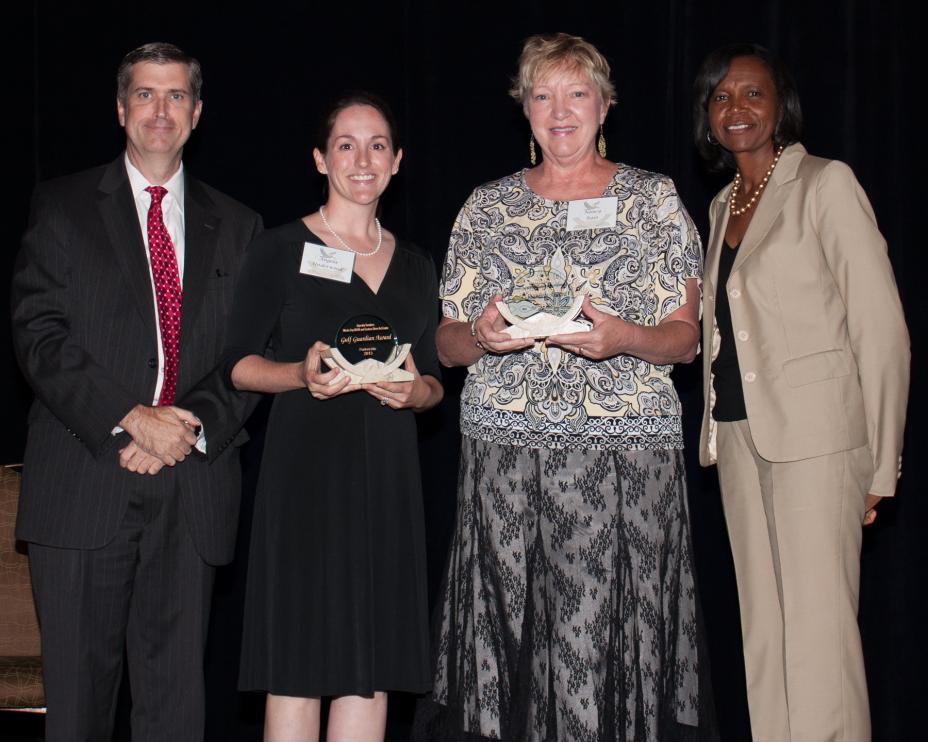 Pictured from left to right include Ben Scaggs, Angela Underwood, Nancy Raia & Beverly Banister
Pictured from left to right include Ben Scaggs, Angela Underwood, Nancy Raia & Beverly Banister
3rd Place Partnerships
Squeaky Sneakers
Weeks Bay NERR and Eastern Shore Art Center
Fairhope, Alabama
Squeaky Sneakers, an interdisciplinary program that marries art and informal science education as a teaching tool, was so named because participants’ wet shoes “squeak” while exploring Weeks Bay Reserve. Since 2008, Squeaky Sneakers has delivered experiential environmental education and art to over 500 participants ranging in age from preschool to senior citizens with a variety of abilities and backgrounds. Squeaky Sneakers strives to enhance ecological awareness and protection among culturally diverse and underserved communities and has worked with groups including Fairhope Rotary Youth Club, Foley Snook Youth Club, The Arc of Baldwin County, Fairhope UMC’s Shepherd’s Place, Camp Horizon Girls Wilderness Program, Baldwin County Public Schools Summer Programs, and Southwest Alabama Regional School for the Deaf and Blind.
